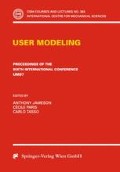Abstract
The process of learning is an incremental exploration of a domain; we do not learn the concepts in a domain in an isolated manner, but instead augment our existing knowledge with new concepts. Consequently, when teaching a new concept to a student, her existing knowledge should be employed in a way which facilitates the process of learning. In describing a new concept to a hearer, it is often beneficial to compare the concept to other concepts with which the hearer is familiar. In particular, comparisons are often used in descriptions in order to reduce the cognitive load on the hearer. This paper outlines three types of comparison found in encyclopaedia descriptions, and describes how a model of the user’s knowledge can be employed to produce descriptions which introduce new concepts by comparison, thus grounding descriptions in the hearer’s existing knowledge. The results are illustrated in the peba-ii natural language generation system.
Thanks to Robert Dale, Eric Horvitz, Mike Johnson, Cécile Paris and the members of mri for useful
Access this chapter
Tax calculation will be finalised at checkout
Purchases are for personal use only
Preview
Unable to display preview. Download preview PDF.
References
Dale, R., and Milosavljevic, M. (1996). Authoring on demand: Natural language generation of hypermedia documents. In Proceedings of the First Australian Document Computing Symposium (ADCS’96). Melbourne, Australia.
Dale, R., Milosavljevic, M., and Oberlander, J. (1997). The web as dialogue: The role of natural language generation in hypertext. In Proceedings of the AAAI Spring Symposium on Natural Language Processing for the World Wide Web, 35–43. Stanford University, California.
Encyclopaedia Britannica. (1996). Copyright ©1996 Encyclopaedia Britannica, Inc.
McCoy, K. F. (1995). Generating context-sensitive responses to object-related misconceptions. Artificial Intelligence 41:157–195.
McKeown, K. R. (1985). Discourse strategies for generating natural-language text. Artificial Intelligence 27:1–41.
Microsoft (R) Encarta’95 Encyclopedia. (1995). Copyright ©1994 Microsoft Corporation. Copyright © 1994 Funk and Wagnall’s Corporation.
Milosavljevic, M. (1996). Introducing new concepts via comparison: A new look at user modeling in text generation. In Proceedings of the Fifth International Conference on User Modeling, Doctoral Consortium, 228–230.
Milosavljevic, M., and Dale, R. (1996). Strategies for comparison in encyclopaedia descriptions. In Proceedings of the 8th International Workshop on Natural Language Generation, 161–170. Sussex, UK.
Milosavljevic, M., Tulloch, A., and Dale, R. (1996). Text generation in a dynamic hypertext environment. In Proceedings of the Nineteenth Australasian Computer Science Conference, 417–426. Melbourne, Australia.
Milosavljevic, M. (1997). Content selection in comparison generation. In Proceedings of the Sixth European Workshop on Natural Language Generation. Duisburg, Germany.
Moore, J. D. (1989). A Reactive Approach to Explanation in Expert and Advice-Giving Systems. Ph.D. Dissertation, University of California, Los Angeles.
Moore, J. D. (1995). Participating in Explanatory Dialogs: Interpreting and Responding to Questions in Context. Cambridge, MA: MIT Press.
Paris, C. L. (1987). The Use of Explicit User Models in Text Generation: Tailoring to a User’s Level of Expertise. Ph.D. Dissertation, Columbia University.
Paris, C. L. (1993). User Modeling in Text Generation. London: Pinter Publishers.
The Australian A-Z Animal Archive. (1996). http://www.aaa.com.au/A_Z/Home.html
The New Grolier Multimedia Encyclopedia. (1992). ©Grolier Incorporated, © 1987–1992 Online Computer Systems, Inc.
Tversky, A. (1977). Features of similarity. Psychological Review 84:327–352.
Zukerman, I., and McConachy, R. (1993). Generating concise discourse that addresses a user’s inferences. In Proceedings of the Thirteenth International Joint Conference on Artificial Intelligence, 1202–1207. Chambery, France.
Author information
Authors and Affiliations
Editor information
Editors and Affiliations
Rights and permissions
Copyright information
© 1997 Springer-Verlag Wien
About this paper
Cite this paper
Milosavljevic, M. (1997). Augmenting the User’s Knowledge via Comparison. In: Jameson, A., Paris, C., Tasso, C. (eds) User Modeling. International Centre for Mechanical Sciences, vol 383. Springer, Vienna. https://doi.org/10.1007/978-3-7091-2670-7_15
Download citation
DOI: https://doi.org/10.1007/978-3-7091-2670-7_15
Publisher Name: Springer, Vienna
Print ISBN: 978-3-211-82906-6
Online ISBN: 978-3-7091-2670-7
eBook Packages: Springer Book Archive

